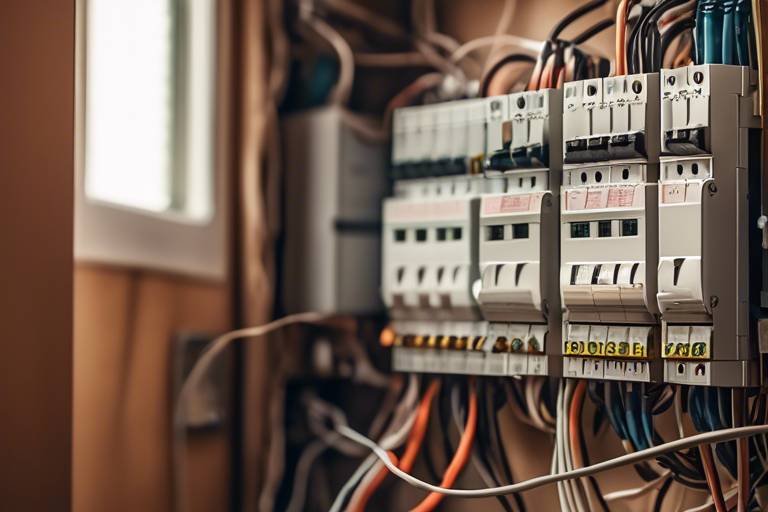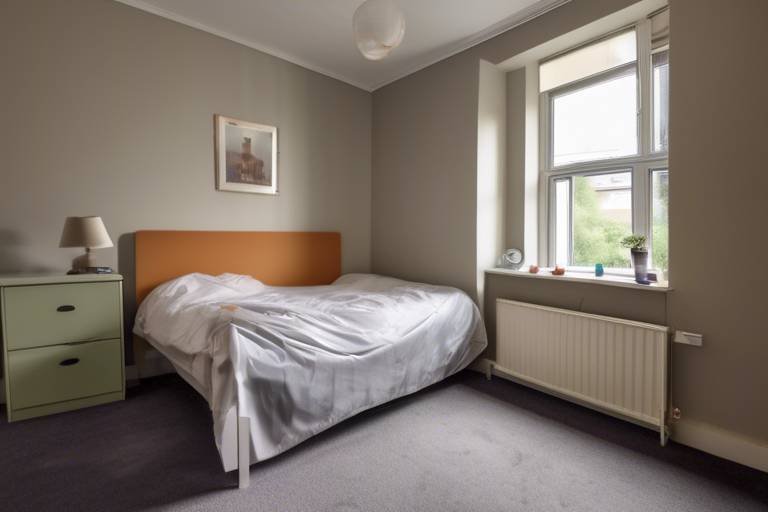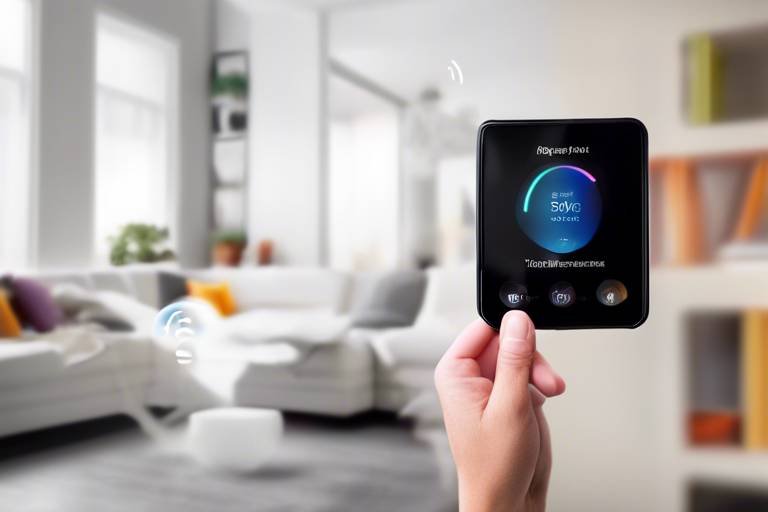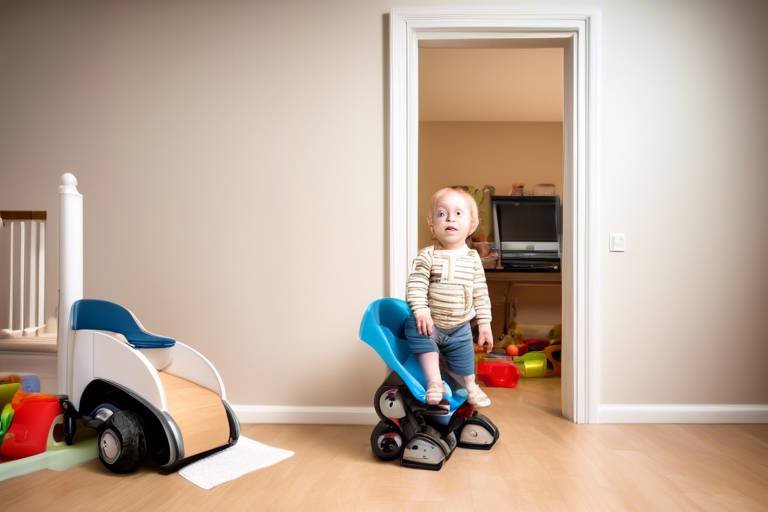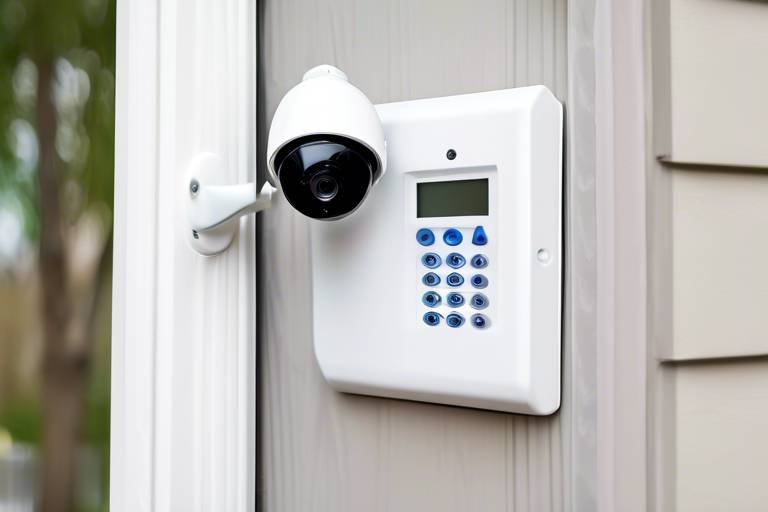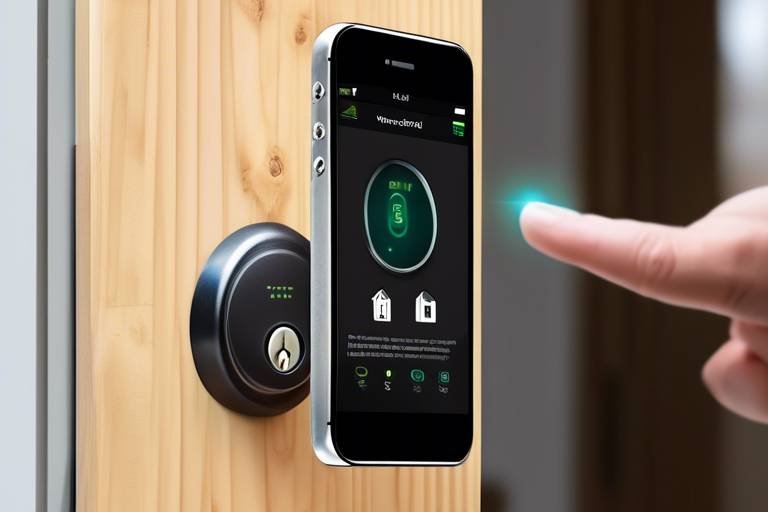Window Security Tips to Keep your Home Safe
In today's world, ensuring the security of your home is more crucial than ever. Windows, often seen as mere openings to let in light and air, can actually serve as weak points in your home’s defense. This article explores essential window security tips to enhance the safety of your home. Discover effective strategies to deter intruders and protect your loved ones and belongings. By understanding the vulnerabilities of your windows and implementing the right measures, you can create a fortress that not only looks inviting but also keeps unwanted visitors at bay.
Before you can secure your windows, it's essential to understand their vulnerabilities. Many homeowners underestimate how easily a determined burglar can exploit these weaknesses. Common issues include:
- Old or damaged locks that can be easily manipulated.
- Windows that are left open or partially ajar, providing an easy entry point.
- Glass that is not tempered or laminated, making it easier to break.
Identifying these vulnerabilities is the first step towards implementing effective security measures. By being aware of how intruders might think, you can better prepare your home to thwart their plans.
When it comes to window security, the locks you choose play a pivotal role. There are various types of window locks available on the market, each offering different levels of security. For instance, traditional sash locks may not provide adequate protection against modern burglary techniques. Instead, consider investing in more robust options such as:
- Keyed locks that require a key to open.
- Sliding window locks that secure the window in place.
- Window pins that prevent the window from being lifted out of its frame.
Understanding the differences can help you select the most secure options for your home. Remember, a lock is only as strong as its installation, so ensure that all locks are fitted correctly.
Another important aspect of window security is the type of glass you use. Single-glazed windows are less secure than their double-glazed counterparts. Double-glazed windows provide an extra layer of protection due to the two panes of glass, which are more challenging to break. Each type offers unique benefits that can affect overall home security. For instance, double-glazed windows not only deter intruders but also provide better insulation, helping you save on energy costs.
Impact-resistant windows can withstand forceful blows, making them an excellent choice for security. These windows are designed to absorb impact without shattering, providing a formidable barrier against break-ins. Discover how they can protect your home from break-ins and potentially save you from costly repairs associated with damaged glass.
Different locking mechanisms provide varying levels of security. For example, some locks automatically engage when the window is closed, while others require manual locking. Learn about the best options available to ensure your windows remain secure. Investing in high-quality locking mechanisms can significantly enhance your home’s security profile.
If you’re looking for an additional layer of protection, consider applying window security films. These films can enhance the strength of your glass, making it more difficult for intruders to break through. Understand how applying these films can help deter break-ins and provide additional safety. Not only do they improve security, but they also offer UV protection and reduce glare, enhancing your overall living environment.
The way you landscape around your windows can impact security. Strategic planting and design can deter potential intruders. For example, tall shrubs or hedges can obscure windows from view, making it harder for burglars to plan an entry. Additionally, incorporating thorny plants near windows can create a natural barrier that is less inviting for intruders.
Using hedges and shrubs can create natural barriers. They not only enhance the aesthetic appeal of your home but also serve as a deterrent. Ensure that these plants do not provide cover for intruders but rather obscure their view of your windows, making it difficult for them to gauge whether anyone is home.
Proper outdoor lighting can significantly improve window security. Well-lit areas deter criminal activity and enhance visibility around your home. Consider installing motion-sensor lights that automatically illuminate when someone approaches. This unexpected burst of light can startle potential intruders and make them think twice about their actions.
Maintaining and upgrading your windows is crucial for security. Regular checks and improvements can keep your home safe from intruders. For example, inspect your windows for wear and tear, ensuring that locks function correctly and that glass is intact.
Regular inspections for wear and tear can help identify potential security issues. Look for signs of rust on locks, gaps in the sealing around windows, or any damage to the glass itself. Learn what to look for and when to make repairs to ensure your windows remain a strong line of defense.
Smart window technology can enhance your home’s security. Explore the benefits of integrating smart locks and sensors for added peace of mind. These devices can send alerts to your phone if a window is opened unexpectedly, allowing you to react quickly. With the rise of smart home technology, securing your windows has never been easier.
Q: What are the most secure types of window locks?
A: The most secure types include keyed locks, sliding window locks, and window pins that prevent lifting.
Q: How can I improve the security of my existing windows?
A: You can enhance security by installing window security films, upgrading locks, and ensuring proper maintenance.
Q: Do outdoor lights really deter burglars?
A: Yes! Well-lit areas can significantly deter criminal activity and make it harder for intruders to approach unnoticed.

Understanding Window Vulnerabilities
When it comes to securing your home, windows are often the most overlooked entry points. Many homeowners assume that doors are the primary targets for burglars, but in reality, windows can be just as vulnerable, if not more so. Understanding the common weaknesses in windows is essential for implementing effective security measures that can deter potential intruders and keep your loved ones safe.
One of the most significant vulnerabilities lies in the type of window you have. For instance, older windows with single panes of glass are much easier to break than modern double-glazed options. This is because single-glazed windows can shatter with a single hit, providing a quick and quiet way for a burglar to gain entry. On the other hand, double-glazed windows are designed to be more robust, offering a layer of insulation and a level of security that makes them much harder to breach.
Another critical factor is the locking mechanisms that come with your windows. Many standard locks can be easily manipulated or picked by experienced intruders. For example, simple sliding locks on patio doors or windows can often be forced open with minimal effort. It’s crucial to invest in high-quality locks that provide a higher level of security. Look for locks that are made from durable materials and have complex mechanisms that are difficult to tamper with.
Additionally, the positioning of your windows can create vulnerabilities. Windows that are easily accessible from the ground, especially those hidden from street view by fences or bushes, can be prime targets for burglars. They may see these windows as easy entry points where they can break in without being noticed. To combat this, consider the visibility of your windows and whether they are adequately lit at night. A well-lit exterior can deter intruders who prefer to work in the shadows.
Moreover, it’s essential to consider the surrounding environment of your windows. Items such as ladders, garden tools, or even low-hanging branches can provide a boost for an intruder looking to access your windows. Regularly assess your yard and remove any potential climbing aids. In addition, maintaining a clear line of sight to your windows will help ensure that any suspicious activity can be easily spotted.
In summary, understanding window vulnerabilities is the first step towards enhancing your home’s security. By recognizing the weaknesses in your windows, you can take proactive measures to fortify them against potential threats. Whether it’s upgrading to more secure locks, opting for double-glazed windows, or maintaining a clear and well-lit exterior, every little change you make can significantly improve your overall safety.

Choosing the Right Window Locks
When it comes to securing your home, is a fundamental step that shouldn't be overlooked. Think of your windows as the eyes of your home; they need to be protected just as much as the doors. After all, a beautiful view shouldn’t come at the cost of your safety! With a variety of locks on the market, understanding the differences can empower you to make informed decisions that enhance your home’s security.
First, let’s talk about the most common types of window locks available. You’ll find options such as sash locks, keyed locks, and window latches. Each type serves a specific purpose and offers varying levels of security. For instance, sash locks are often used on sliding windows and are relatively simple to operate, but they can be easily compromised if not paired with additional security measures. On the other hand, keyed locks provide an extra layer of protection, as they require a key to operate, making it more difficult for an intruder to gain access.
Now, let’s dive deeper into these locking mechanisms. If you’re considering upgrading your window security, you might want to look into multi-point locking systems. These locks engage at multiple points along the window frame, distributing force and making it significantly harder for anyone to pry the window open. Imagine trying to force open a door that has multiple locks; it’s a lot more work and noise, right? This is the kind of deterrent that multi-point locks provide.
In addition to the type of lock, the material and quality of the locking mechanism also play a crucial role. Locks made from hardened steel or high-quality alloys are generally more resistant to tampering. When shopping for window locks, always look for products that meet safety standards and have undergone rigorous testing. A lock that’s easy to install but flimsy in construction is like a paper shield in a battle; it simply won’t hold up against a determined intruder.
Another aspect to consider is the compatibility of locks with your windows. Not all locks fit all window types. For example, if you have double-hung windows, you’ll want to choose locks specifically designed for those. If your windows are older, you might need to replace them or find specialized locks that fit their unique dimensions. It’s like trying to fit a square peg into a round hole; it just won’t work! Proper fitting ensures that the lock functions effectively and provides the security you need.
Lastly, don't forget about the importance of regular maintenance. Just because you have high-quality locks doesn’t mean you can ignore them. Regularly check for any signs of wear and tear, and lubricate the mechanisms to ensure they operate smoothly. A well-maintained lock is your first line of defense against potential break-ins.
In summary, choosing the right window locks involves understanding the types available, considering the material and quality, ensuring compatibility with your windows, and committing to regular maintenance. By taking these factors into account, you can significantly enhance your home’s security and enjoy peace of mind knowing your loved ones and belongings are well-protected.

Single and Double-Glazed Windows
When it comes to window security, understanding the differences between single-glazed and double-glazed windows is essential. Single-glazed windows consist of just one layer of glass, making them more vulnerable to break-ins. A determined burglar can easily break through a single layer, leaving your home exposed. On the other hand, double-glazed windows feature two layers of glass separated by a space filled with gas, which not only improves insulation but also adds a layer of security. This added thickness can deter intruders, making it harder for them to gain access to your home.
Moreover, double-glazed windows are often equipped with better locking mechanisms, which can further enhance their security features. The increased strength of the double layer means that even if a burglar attempts to break the glass, the chances of them succeeding are significantly reduced. In fact, many insurance companies offer discounts for homes with double-glazed windows due to their enhanced safety features.
To illustrate the differences, consider the following table:
| Feature | Single-Glazed Windows | Double-Glazed Windows |
|---|---|---|
| Glass Layers | 1 | 2 |
| Insulation | Poor | Excellent |
| Security | Low | High |
| Cost | Lower | Higher |
In summary, while single-glazed windows may be cheaper initially, investing in double-glazed windows can provide substantial benefits in terms of security and energy efficiency. They act as a formidable barrier against potential intruders, giving you peace of mind. So, if you're considering an upgrade, think about how double-glazed windows can not only enhance the look of your home but also fortify its defenses.

Impact Resistance
When it comes to securing your home, the term often pops up, and for good reason. Imagine a sturdy fortress that can withstand the force of nature and unwanted intruders alike. Impact-resistant windows are designed to do just that. They are built with materials that can endure high levels of stress and force, making them a formidable barrier against break-ins. These windows typically feature laminated glass, which consists of two sheets of glass with a layer of polyvinyl butyral (PVB) sandwiched in between. This unique construction not only makes the glass tougher but also ensures that even if it does shatter, the glass fragments remain adhered to the PVB layer, preventing easy access.
But why should you consider investing in impact-resistant windows? Well, let’s break it down. First and foremost, these windows provide enhanced security. They are tested against various forms of impact, including the kind that might come from a determined burglar or even extreme weather conditions like hurricanes. In fact, many insurance companies offer discounts for homes equipped with impact-resistant features, recognizing the reduced risk they present.
Moreover, the benefits of impact-resistant windows extend beyond just security. They also offer superior insulation, helping to regulate the temperature inside your home and potentially lowering your energy bills. And let’s not forget about noise reduction; if you live in a bustling neighborhood, impact-resistant windows can help create a peaceful sanctuary by minimizing outside noise.
To put it simply, investing in impact-resistant windows is like fortifying your home with a shield. They provide peace of mind, knowing that your loved ones and belongings are protected against both environmental threats and criminal activity. In the long run, this investment not only enhances your home’s security but also its overall value.
In conclusion, when considering your home’s security, don’t overlook the power of impact resistance. It’s not just about keeping intruders out; it’s about creating a safe haven for you and your family. So, the next time you’re evaluating your window options, remember that impact-resistant windows could be your best defense against the unexpected.
- What are impact-resistant windows made of?
Impact-resistant windows are typically made of laminated glass, which consists of two layers of glass with a layer of PVB in between. This construction helps prevent shattering and enhances security.
- How do impact-resistant windows help during storms?
These windows can withstand high winds and flying debris, making them ideal for areas prone to hurricanes and severe weather conditions.
- Are impact-resistant windows more expensive?
While they may have a higher upfront cost, the long-term savings on energy bills and potential insurance discounts can make them a worthwhile investment.
- Can I install impact-resistant windows myself?
It is recommended to have them professionally installed to ensure they are properly fitted and sealed for maximum effectiveness.

Locking Mechanisms
When it comes to securing your home, window locking mechanisms play a pivotal role in keeping intruders at bay. You might be surprised to learn that not all locks are created equal! Understanding the various types of locking systems available can significantly enhance your home’s security. Think of your window locks as the first line of defense; if they’re weak, it doesn’t matter how strong your windows are.
There are several types of locking mechanisms you should consider:
- Keyed Locks: These are the most traditional locks and require a key to unlock. They provide a good level of security, but make sure to keep your keys in a safe place!
- Sliding Window Locks: These locks are specifically designed for sliding windows. They often come with a pin or latch mechanism that secures the window in place, preventing it from being opened from the outside.
- Window Sash Locks: Commonly used in double-hung windows, sash locks can be easily engaged with a simple turn of a lever. They are effective but should be supplemented with additional security measures.
- Smart Locks: The latest in window security technology, smart locks allow you to control your windows remotely via a smartphone app. They often come with features like alerts and monitoring, adding an extra layer of security.
Each locking mechanism offers different levels of security and convenience. For instance, while keyed locks provide a traditional sense of security, smart locks offer modern technology that can alert you to any suspicious activity around your windows. It’s essential to evaluate your specific needs and choose locks that align with your security goals.
Moreover, it’s not just about the locks themselves, but also how they are installed. A poorly installed lock can be just as ineffective as having no lock at all. Ensure that locks are fitted tightly and that there are no gaps that could be exploited. Regular maintenance is also key; check the functionality of your locks periodically to ensure they are working properly.
In conclusion, investing in high-quality locking mechanisms is crucial for enhancing your home’s security. Remember, a strong lock is your best friend when it comes to deterring potential intruders. So, take the time to research your options and make informed choices that will keep your home safe and sound!
Q: What is the best type of window lock for security?
A: The best type of window lock depends on your specific needs, but generally, a combination of keyed locks and smart locks offers excellent security.
Q: How often should I check my window locks?
A: It's advisable to inspect your window locks at least twice a year to ensure they are functioning properly and to identify any potential issues early.
Q: Can I upgrade my existing window locks?
A: Yes, you can upgrade your existing window locks. Many modern locks can be retrofitted to existing windows, enhancing your security without needing to replace the entire window.

Window Security Film
When it comes to enhancing the security of your home, is often an overlooked hero. This thin, yet powerful layer of film is designed to be applied directly to your existing glass windows, transforming them into a more resilient barrier against break-ins. Imagine your window as a simple piece of paper; adding security film is like wrapping that paper in a tough, protective layer that makes it much harder to tear apart. Not only does this film deter potential intruders, but it also adds a layer of safety for you and your loved ones in case of accidental breakage.
One of the most significant advantages of window security film is its ability to hold shattered glass together. In the unfortunate event that a burglar attempts to break your window, the film prevents the glass from shattering into dangerous shards, reducing the risk of injury. This feature is particularly beneficial for homes with children or pets, as it minimizes the chances of accidents caused by broken glass. Moreover, many security films also offer UV protection, which can help keep your interior furnishings from fading due to sun exposure, adding another layer of benefit to your investment.
There are several types of window security films available on the market, each varying in thickness and strength. For instance, standard security films are typically around 4 to 7 mils thick, providing a solid defense against break-ins. On the other hand, impact-resistant films can be even thicker, usually ranging from 8 to 12 mils, designed to withstand more forceful impacts. When choosing a film, consider your specific needs and the level of security you desire. Here’s a quick comparison:
| Type of Film | Thickness (mils) | Benefits |
|---|---|---|
| Standard Security Film | 4-7 | Deters break-ins, holds glass together |
| Impact-Resistant Film | 8-12 | High resistance to impacts, maximum protection |
Applying window security film is a relatively straightforward process, but it’s often best left to professionals to ensure a perfect installation. A poorly applied film can lead to bubbles and peeling, which not only looks unsightly but can also diminish the film's effectiveness. Once installed, you’ll find that maintaining the film is easy; simply clean it with a soft cloth and a mild detergent to keep it looking pristine.
In conclusion, window security film is an excellent investment for homeowners looking to bolster their security measures without the need for complete window replacements. By adding this protective layer, you can enjoy peace of mind knowing that your windows are less vulnerable to break-ins, while also protecting your family from potential harm. So, why not give your windows the upgrade they deserve? After all, a little extra protection can go a long way in keeping your home safe.

Landscaping for Security
When it comes to securing your home, many people often overlook the power of landscaping. The way you design the area around your windows can greatly influence the likelihood of a break-in. Think of landscaping as the first line of defense—like a moat around a castle. It’s not just about aesthetics; it's about creating an environment that makes it difficult for intruders to approach unnoticed. By strategically planning your garden, you can enhance your home’s security while also beautifying your space.
One of the most effective ways to bolster your window security is through the use of natural barriers. Hedges and shrubs can act as shields, obscuring windows from the view of potential burglars. Imagine a thick row of bushes that not only adds a touch of greenery but also makes it challenging for someone to see inside your home. However, it’s essential to choose the right plants. Opt for thorny or dense varieties that can deter intruders while providing you with the privacy you desire.
Moreover, consider the height of your plants. Taller shrubs can create a formidable barrier, while lower ones might not offer enough concealment. A well-planned combination of both can create a layered effect, making it difficult for anyone to approach your windows without being seen. For instance, you might plant taller hedges at the back and shorter shrubs in front to create depth and security.
In addition to plant selection, lighting plays a critical role in landscaping for security. Well-lit areas can deter criminal activity by eliminating shadows where intruders might hide. Installing motion-sensor lights around your windows can be particularly effective. These lights not only illuminate the area when someone approaches but also serve as a warning signal, making potential intruders think twice. The key is to ensure that all entry points are well-lit without creating glare that obscures visibility.
Furthermore, consider the layout of your outdoor space. Avoid creating secluded areas near windows where someone could hide. Instead, design open spaces that allow for clear sightlines. This could mean trimming back overgrown trees or ensuring that fences don’t obstruct views from the street or neighboring properties. The more visibility you have, the less likely an intruder will feel comfortable attempting a break-in.
Lastly, don't forget about the importance of maintenance. Regularly check your landscaping to ensure that plants aren’t overgrowing or providing cover for unwanted visitors. Keeping your yard tidy not only enhances curb appeal but also reinforces security. A well-maintained landscape sends a message that you care about your home and its safety, which can deter potential criminals.
In summary, landscaping is a vital component of your home’s security strategy. By using natural barriers, incorporating effective lighting, planning your layout wisely, and maintaining your yard, you can create a safe haven for you and your loved ones. Remember, a little effort in your landscaping can go a long way in keeping your home secure!
- How can landscaping improve my home security? Landscaping can create natural barriers that obscure windows and deter intruders, while proper lighting can eliminate hiding spots.
- What types of plants are best for security? Thorny shrubs and dense hedges are excellent choices as they provide both privacy and a deterrent.
- How important is outdoor lighting for security? Outdoor lighting is crucial as it illuminates dark areas, making it difficult for intruders to approach unnoticed.
- Should I trim my plants regularly? Yes, regular maintenance is essential to ensure that your landscaping continues to provide security and visibility.

Hedges and Shrubs
When it comes to securing your home, the landscape around your windows can play a surprisingly pivotal role. are not just for aesthetics; they can act as a natural barrier that deters potential intruders. Imagine walking past a house where the windows are obscured by lush greenery. Wouldn't it make you think twice before attempting a break-in? That's the power of strategic landscaping!
By carefully choosing the right types of plants, you can create a protective shield around your windows. For instance, dense hedges can obscure the view into your home, making it difficult for burglars to see whether anyone is inside or what valuables might be lying around. The less they can see, the less likely they are to take the risk. Additionally, thorny shrubs can add an extra layer of defense. Picture a burglar trying to navigate through a prickly bush; it’s not the most inviting scenario!
Here are some effective plants you might consider for enhancing your home security:
- Boxwood: A dense shrub that can be easily shaped into a hedge.
- Holly: Not only does it provide privacy, but its spiky leaves can deter intruders.
- Rose bushes: They offer beauty and a formidable barrier with their thorns.
It's essential to maintain these plants properly. Overgrown hedges can become a hiding spot for burglars, so regular trimming is key. Additionally, consider the height of your shrubs. Ideally, you want them tall enough to block the view but not so tall that they provide cover for someone trying to break in. A good rule of thumb is to keep them under three feet in height while ensuring they are dense enough to obscure the view.
Furthermore, integrating landscape lighting around these plants can enhance their effectiveness. A well-lit garden not only highlights your beautiful greenery but also eliminates dark corners where intruders might lurk. Remember, visibility is a significant deterrent for criminal activity. So, when you think about your home's security, don't overlook the power of hedges and shrubs; they can be your first line of defense in keeping your loved ones and belongings safe.
Q: How do hedges and shrubs help in preventing break-ins?
A: They obscure windows from view, making it difficult for burglars to see valuables inside and whether anyone is home. Additionally, thorny plants can act as a physical barrier.
Q: What types of shrubs are best for security?
A: Dense and thorny shrubs like holly and rose bushes are effective, as they provide both privacy and a deterrent against intruders.
Q: How should I maintain my hedges for optimal security?
A: Regular trimming is essential to keep them dense and at a manageable height. Overgrown hedges can provide cover for intruders, so aim to keep them under three feet tall.

Lighting Considerations
When it comes to securing your home, lighting plays a pivotal role that often goes overlooked. Imagine this: you're coming home late at night, and the entire area around your house is shrouded in darkness. Not only does it feel eerie, but it also makes your home an inviting target for intruders. Proper outdoor lighting can act as a powerful deterrent, making it less appealing for burglars to approach your windows. The key here is to create a well-lit environment that enhances visibility while maintaining an inviting atmosphere.
One effective strategy is to install motion-sensor lights around your property. These lights automatically turn on when they detect movement, startling potential intruders and drawing attention to their presence. It’s like having a vigilant guard that lights up the area at the slightest hint of trouble. Additionally, consider using LED lights for their energy efficiency and longer lifespan. They provide bright illumination without the hefty electricity bill.
Another important aspect is to strategically position your lights. Focus on areas that are typically darker and could provide cover for someone trying to break in. For instance, place lights near:
- Windows and entrances
- Driveways and walkways
- Dark corners of your yard
By illuminating these spots, you reduce the chances of a burglar finding a hidden entry point. But don’t stop there! It’s also crucial to ensure that your landscaping doesn’t obstruct your lighting. Tall bushes or overgrown trees can create shadows and blind spots, so keep your greenery trimmed and well-maintained.
Moreover, consider using a combination of ambient and task lighting to enhance the overall security of your property. Ambient lighting offers general illumination, while task lighting focuses on specific areas, such as pathways or driveways. This layered approach not only improves visibility but also adds a welcoming touch to your home’s exterior.
Lastly, remember that a well-lit home can also give the impression that someone is always home, even when you’re not. You can use timers or smart home technology to schedule your lights to turn on and off at certain times. This creates an illusion of occupancy, which is a psychological barrier that can discourage would-be burglars from targeting your home.
In conclusion, lighting is not just about aesthetics; it’s a critical component of your home security strategy. By investing in the right lighting solutions and strategically placing them around your property, you can significantly reduce the risk of break-ins and enhance the safety of your loved ones and belongings.
Q1: How bright should my outdoor lights be for security?
A1: Generally, outdoor lights should be bright enough to illuminate your yard and entry points clearly. Aim for at least 800 lumens for motion-sensor lights and 300-500 lumens for pathway lighting.
Q2: Are motion-sensor lights effective?
A2: Yes! Motion-sensor lights are highly effective as they can startle intruders and alert you or neighbors to unusual activity. They also save energy by only turning on when needed.
Q3: Can I use solar lights for security?
A3: Absolutely! Solar lights can be a great eco-friendly option for outdoor lighting. Just ensure they are placed in areas that receive ample sunlight during the day to charge effectively.
Q4: How can I maintain my outdoor lights?
A4: Regularly check and clean your outdoor lights to ensure they function properly. Replace burnt-out bulbs promptly, and consider seasonal maintenance to avoid any obstructions from plants or debris.

Regular Maintenance and Upgrades
Maintaining and upgrading your windows is not just about aesthetics; it's a critical aspect of ensuring your home remains secure from potential intruders. Think of your windows as the eyes of your home—if they’re not well cared for, they can become weak points that burglars exploit. Regular maintenance involves checking for wear and tear, ensuring that all locks function properly, and replacing any damaged components. By keeping your windows in top shape, you not only enhance their appearance but also their resilience against break-ins.
When it comes to maintenance, it’s essential to adopt a proactive approach. For instance, inspect the window frames for signs of rot or damage, especially if you have wooden frames. This can be a silent threat, as decaying wood can compromise the structural integrity of your windows. Additionally, make it a habit to check the seals and weather stripping. Damaged seals can lead to air leaks, which not only affect energy efficiency but can also indicate a potential entry point for intruders.
Upgrading your windows is another vital step in enhancing security. Modern technology has introduced a variety of options that can significantly improve your home’s defenses. For example, consider replacing traditional locks with smart locks that can be controlled via your smartphone. These locks often come with features like tamper alerts and remote locking capabilities, giving you peace of mind whether you’re at home or away. Moreover, integrating window sensors can provide an extra layer of protection by alerting you to any unauthorized access.
Additionally, if your windows are old, it may be worth investing in impact-resistant glass. This type of glass is designed to withstand forceful blows, making it much harder for intruders to gain access. While this upgrade may require a higher initial investment, the long-term benefits in terms of security and energy efficiency can be substantial.
Regular maintenance and timely upgrades can transform your windows from mere openings to formidable barriers against intruders. Remember, the goal is to create an environment that not only looks good but also keeps you and your loved ones safe. A well-maintained home is a happy home, and with these tips, you can ensure that your windows contribute positively to your overall security strategy.
- How often should I inspect my windows for maintenance? It's advisable to inspect your windows at least twice a year, ideally in spring and fall, to catch any issues before they escalate.
- What are the signs that I need to upgrade my window locks? If your locks are rusty, difficult to operate, or if you’ve misplaced your keys multiple times, it may be time to consider an upgrade.
- Are impact-resistant windows worth the investment? Yes, they provide enhanced security and can also improve energy efficiency, making them a worthwhile investment for many homeowners.
- What is the best type of smart lock for windows? Look for smart locks that offer remote access, tamper alerts, and compatibility with home automation systems for optimal security.

Inspecting for Wear and Tear
When it comes to keeping your home secure, regular inspections of your windows are crucial. Just like you wouldn’t ignore a strange noise coming from your car, you shouldn’t overlook signs of wear and tear on your windows. These signs can be subtle but can lead to significant vulnerabilities if left unchecked. Start by examining the frames for any cracks or rotting wood, as these issues can compromise the structural integrity of your windows. A window that doesn’t close properly is an open invitation for intruders, so make sure to check the seals and hinges as well.
Next, look at the glass itself. Are there any chips or cracks? Even the smallest damage can weaken the glass, making it easier for someone to break in. If you notice any issues, it’s best to address them immediately. Replacing a damaged pane is far less costly than dealing with the aftermath of a break-in. Additionally, take a moment to inspect the locking mechanisms. Are they functioning smoothly? If you find that a lock is sticky or doesn’t engage properly, it’s time to replace it. Remember, the lock is your first line of defense, so it needs to be in top condition.
It's also wise to consider the age of your windows. If they are older models, they may not meet modern security standards. In such cases, you might want to think about upgrading to more secure options. Newer windows often come with improved locking systems and reinforced glass, providing an extra layer of protection. While it may seem like an investment, think of it as a long-term savings plan—one that protects your home and your peace of mind.
To help you keep track of your inspections, consider creating a simple checklist. Here’s a quick overview of what to include:
- Check window frames for cracks or rot
- Inspect glass for chips or cracks
- Test the functionality of locks
- Evaluate the age of the windows
- Look for signs of wear in the seals and hinges
By being proactive and conducting these inspections regularly, you can catch potential issues before they become serious problems. Not only does this help in maintaining your home’s security, but it also enhances its overall value. After all, a well-maintained home is a safe home. So grab your checklist, put on your inspection hat, and make window security a priority!
Q: How often should I inspect my windows for wear and tear?
A: It's recommended to inspect your windows at least twice a year, ideally in the spring and fall, to catch any issues before they worsen.
Q: What should I do if I find a crack in my window?
A: If you find a crack, it's best to replace the glass as soon as possible to prevent further damage and maintain security.
Q: Are there any specific signs that indicate I need to replace my windows?
A: Yes, signs include difficulty opening or closing, visible cracks, condensation between panes, and drafts. If you notice any of these, consider replacing your windows.
Q: Can I improve my window security without replacing them?
A: Absolutely! You can enhance security by adding window locks, applying security film, or installing window sensors that alert you to any breaches.

Upgrading to Smart Technology
In today’s fast-paced world, is not just a trend; it’s a necessity. Imagine being able to monitor your home’s security from anywhere in the world, all thanks to your smartphone. Smart window technology offers a plethora of benefits that can enhance your home’s security and provide you with peace of mind. With the rise of the Internet of Things (IoT), integrating smart locks, sensors, and cameras into your window security system is easier than ever.
One of the most appealing aspects of smart window technology is the ability to receive real-time alerts. For instance, if a window is opened or broken, you can receive an instant notification on your phone, allowing you to take action immediately. This kind of instantaneous feedback can be a game-changer, especially for those who travel frequently or have second homes. You can even set up your system to alert local authorities if a break-in is detected, adding an extra layer of security.
Moreover, many smart window locks come equipped with features such as remote locking and unlocking. Have you ever left home and suddenly wondered if you locked the windows? With smart locks, you can check their status and lock or unlock them from your phone. This is particularly useful for families with children, as you can ensure that your kids are safe without needing to run back home to check.
When considering an upgrade, it’s essential to choose systems that are compatible with your existing home automation setup. Many smart devices can communicate with each other, allowing you to create a cohesive security network. For example, you can link your smart window locks with your security cameras, enabling you to see who is at your window before deciding to unlock it. This interconnectivity not only enhances security but also streamlines your home management.
However, while the benefits are numerous, it’s crucial to consider the potential downsides as well. Smart technology can be vulnerable to hacking, so it’s vital to choose reputable brands and ensure that your devices are updated regularly with the latest security patches. Additionally, having a backup plan, like traditional locks, can provide extra reassurance in case of a technology failure.
In conclusion, upgrading to smart technology for your windows is a smart move that can significantly enhance your home’s security. With features like real-time alerts, remote access, and interconnectivity with other smart devices, you can create a comprehensive security system that not only protects your home but also gives you peace of mind. So, why wait? Start exploring smart window solutions today and take your home security to the next level!
- What are the benefits of smart window technology? Smart window technology offers real-time alerts, remote locking and unlocking, and compatibility with other smart home devices, enhancing overall security.
- Are smart window locks safe from hacking? While they can be vulnerable, using reputable brands and keeping devices updated can mitigate risks.
- Can I integrate smart window technology with my existing home security system? Yes, many smart devices are designed to work together, allowing for a cohesive security network.
- What should I do if my smart window technology fails? It’s wise to have traditional locks as a backup and to ensure regular maintenance of your smart devices.
Frequently Asked Questions
- What are the common vulnerabilities in windows that I should be aware of?
Windows can be vulnerable due to factors like weak locks, single-pane glass, and poor installation. Burglars often exploit these weaknesses, so it's essential to assess your windows and identify any potential security risks.
- What types of window locks are the most secure?
There are various types of window locks, including key-operated locks, sash locks, and sliding window locks. The most secure options are often multi-point locking systems and deadbolts, which provide added protection against forced entry.
- How do impact-resistant windows enhance security?
Impact-resistant windows are designed to withstand strong impacts, making them difficult to break. They consist of multiple layers of glass and a durable interlayer, which not only protects against break-ins but also shields your home from severe weather conditions.
- Can window security films really make a difference?
Absolutely! Window security films reinforce your glass, making it more shatter-resistant. This added layer of protection can deter burglars by delaying their entry and making it harder for them to access your home.
- How can landscaping improve my window security?
Strategic landscaping can create natural barriers around your windows. By using hedges and shrubs to obscure views, you can make it more challenging for potential intruders to plan their approach and gain access to your home.
- What role does outdoor lighting play in window security?
Proper outdoor lighting is crucial for enhancing security. Well-lit areas around your windows can deter criminal activity, as burglars are less likely to approach a brightly lit home where they can be easily seen.
- How often should I inspect my windows for wear and tear?
It's a good idea to inspect your windows at least twice a year. Look for signs of wear, such as damaged locks, cracked glass, or worn seals. Regular maintenance ensures that any potential security issues are addressed promptly.
- What are the benefits of upgrading to smart window technology?
Smart window technology can enhance your home's security by integrating features like remote locking, sensors, and alerts. This allows you to monitor your windows in real-time and receive notifications if anything seems amiss, giving you peace of mind.






